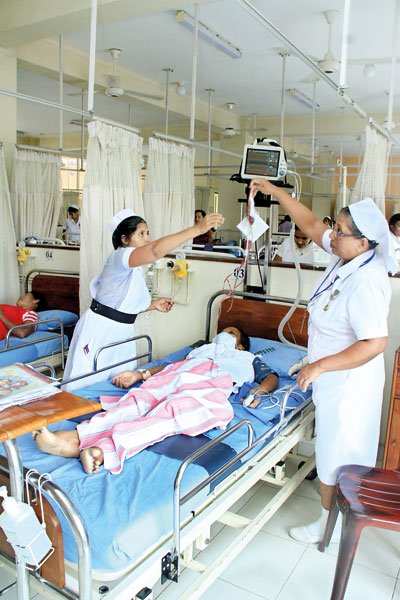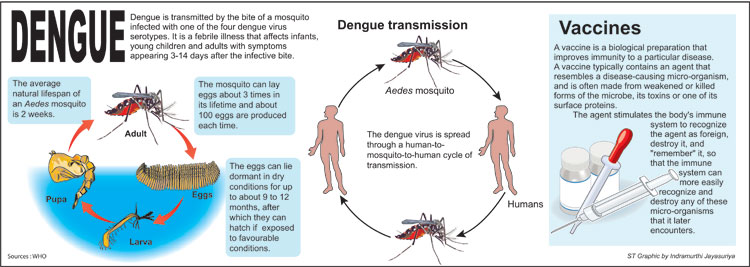News
Fight against dengue moves into powerful preventive phase

Hope in sight: A new vaccine will soon be a reality
The battle against dengue is to be waged in the powerful arena of prevention, with Sri Lanka due to be part of the army which is forging ahead to confront and overcome this virulent malaise of modern times.
The plans to test DENVax under Phase 3 Clinical Trials in Sri Lanka began about two years ago with the highest-level authority, the Health Ministry, playing an active role. This has now been formalised with the signing of a Memorandum of Understanding with Takeda, which is reported to be the largest pharmaceutical company in Japan and Asia and among the top 15 in the world.
The Sunday Times learns that the two-dose DENVax tetravalent vaccine which comes in the form of an injection will be administered to a large number of participants, in the age-group 4 to 16 years, after due consent has been taken.
Voluntary recruitment of the study participants will be carried out after these children and their parents are informed of all details in in-depth discussions with Consultant Paediatricians of what the study entails.
The DENVax vaccine is to be tested in more than 20,000 participants worldwide, in countries with a heavy dengue burden, under the Phase 3 Clinical Trials.
The Sri Lankan ‘sites’ will be the Lady Ridgeway Hospital (LRH) for Children in Colombo, the Colombo South (Kalubowila) Teaching Hospital, the Colombo North (Ragama) Teaching Hospital and the Centre for the Clinical Management of Dengue Fever and Dengue Haemorrhagic Fever in Negombo.
Once approvals have been secured from the National Medicines Regulatory Authority and an accredited Ethics Review Committee, each site will recruit the participants, the Sunday Times learns, with each and every participant being monitored very closely and the follow-up lasting as long as five years.
Clinical Trials comprise ‘Interventional Studies’ or ‘Observational Studies’. ‘Interventional Studies’ are when research participants are assigned to a treatment or other intervention, after which the outcomes are monitored, while in ‘Observational Studies’ participants are observed and the outcomes measured by observation.
The phases of Clinical Trials are:
Phase 1 – Researchers test an experimental drug or therapy in a small group of people (between 20 and 80) for the first time to evaluate its safety, determine a safe dosage range and identify side-effects. This is usually initiated after extensive animal studies.
Phase 2 – The experimental drug or therapy is given to a larger group of people (between 100 and 300) to check whether it is effective and to further evaluate its safety.
Phase 3 – The experimental drug or therapy is given to large groups of people (above 1,000) to confirm its effectiveness, monitor side-effects, compare it to commonly used drugs or therapy, if available, and also to collect information that will allow the experimental drug or therapy to be used safely.
Phase 4 – Post-marketing studies to gather additional information on the drugs or therapy, the risks, benefits and its optimal use.
With the race to find a vaccine against dengue hotting up, five pharmaceutical companies have been in the running. They are Sanofi Pasteur based in France; Takeda in Japan with a partnership in the United States of America; Instituto Butantan in Brazil; GlaxoSmithKline in the United Kingdom; and Merck in the United States of America. The first dengue vaccine, Dengvaxia (CYD-TDV) has been manufactured by Sanofi Pasteur.
According to reams of information from the World Health Organization (WHO) on dengue and dengue vaccines, CYD-TDV is the first dengue vaccine to be licensed, with the licensing occurring in Mexico in December 2015 for use in individuals 9-45 years of age living in endemic areas. It is a live recombinant tetravalent dengue vaccine given as a three-dose series on a 0/6/12 month schedule.
“The WHO Strategic Advisory Group of Experts (SAGE) on Immunization reviewed CYD-TDV last month (April 2016) and recommended countries consider introduction of the vaccine only in geographic settings (national or sub-national) with high endemicity. A WHO vaccine position paper will be published outlining WHO recommendations in July 2016,” the WHO states, adding that the CYD-TDV is currently not prequalified by the WHO.
Prequalification requires a national regulatory authority (NRA) of record, which is typically the NRA in the manufacturing country. WHO is awaiting a submission of an application from the manufacturer for prequalification of this vaccine, it adds.


